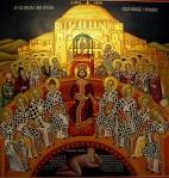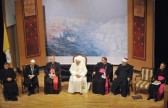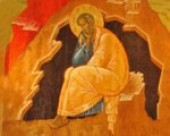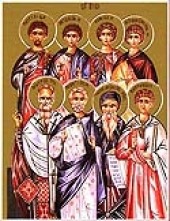From the Counsels of Blessed Epiphanios (Theodoropoulos)
True love is like the flame of a candle. However many candles you light from the flame, the initial flame remains unaffected. It doesn’t lessen at all. And every freshly lit candle has as much flame as the others do.
I want whoever is near me to feel that he has room to breathe, not that he is suffocated. I don’t call anyone to me. I don’t hold onto anyone. I don’t chase anyone away. Whoever wants comes, whoever wants stays, whoever wants leaves. I don’t consider anyone a supporter or a follower.
I am not afraid of death. Not, of course, because of my works, but because I believe in God’s mercy.
Speak more to God about your children than to your children about God…. The soul of the teenager is in a state of an explosion of freedom. For this reason he has a hard time accepting various counsels. So, rather than counseling him continuously and reproaching him now and again, leave the situation to Christ, to the Panaghia (Greek word meaning “All-Holy”. It is perhaps the most beloved term of endearment for the Mother of God in the Greek language) and to the Saints, asking them to bring him to reason.
Don’t be neglectful of prayer! At table, in the morning, afternoon and evening. In particular don’t miss Small Compline for any reason, tired though you may be. It’s a question of self-sacrifice and, in particular, of love. When a beloved person calls you very late at night, how are you able to speak sometimes for a few hours, despite your fatigue, without being put out, but being, rather, pleased?
———-
Deal with your children as with colts, sometimes tightening and other times loosening the bit. When the colt kicks, without abandoning the bit, we loosen it, otherwise it will break. When, however, it is peaceful, then we tighten the bit and take the colt where we like.
———-
Parents should love their children as their children and not as their idols. That is to say, they should love their children as they are and not how they would like them to be-to be like them.
———-
Whoever fears God doesn’t fear anything else.
———-
I am in pain and agonize over the path of the Greek people who are constantly being de-Hellenized, de-Christianized, de-colorized and cut off from their roots, and are losing their identity.
———-
In marriage, abstention solely out of love for God is perfect, “the greatest.”(Elder Epiphanios uses terminology from the grading system at school to make his point. “The greatest” is an “A,” “very good,” is a “B,” etc). When the couple comes together, not obstructing the procreation of children, it is at the level of “very good.” And when they abstain solely to avoid the procreation of children, they are on the level of “good.” In any case all of these categories are above average and are only legitimate with the presupposition that they have been agreed upon by both spouses and not just one. Otherwise it is a sin.
———-
God appointed the salvation of the world to His Son and not to us…. We must first look at our soul and if we can, let’s help five or six people around us.
———-
When someone is free, he has rights and responsibilities. When he marries, he has few rights and very many responsibilities. When, however, he has children, he doesn’t have any rights at all, but only responsibilities.
———-
Why do they put rubber tires with inner tubes on cars? So that they give in, to collapse a little with every little stone or pothole on the road, and in this way they pass obstacles. If the wheels were firm and unyielding, the car wouldn’t be able to move forward. It would fall apart after a short distance because of the vibration from the small inconsistencies of terrain. The same thing happens with yielding to others in the family. In this way many problems are surpassed and continuous spiritual progress is assured.
———-
When people treat us unjustly, God justifies us.
———-
[God allows virtuous people to suffer] so that they might be purified from even the slightest traces of their passions and so that they might receive an even greater crown in Heaven. Furthermore, as He allowed His beloved Son to suffer and to die on the Cross, what can we say for those people who, as holy as they may be, have filth and stains from sin?
———-
Sadness purifies us. Man is truly man in sadness. In joy he is changed, he becomes someone else. In sadness he becomes that which he truly is. And this is the way, par excellence, that he approaches God. He senses his weakness. Many times, when he is in glory and joy, he feels that he is the “eye of the earth” or, if you prefer, the center of the universe: “I am, and nobody else!”
In pain and sadness he feels like an insignificant ant in the universe, that he is completely dependent, and he seeks the help and companionship of God. Those of us who have passed through pains, either psychical or physical, know that we never prayed as hard and with such quality and length, as we did when we were in the bed of pain or when some heavy psychical sadness tested us. While, when we have everything, we forget prayer and fasting, and many things. It is for this reason that God allows pain.
———-
Don’t sit, glued to the television…. Guard yourselves from the means of mass blinding.
We didn’t come here [to the monastery] mainly for handiwork, or for the gardens or for the buildings. For even without these things we can save our soul. We came here primarily for the soul. And in order to save the soul, we must pass the day without sin, with meekness, canon (In this case, the daily rule of prayer, reading, prostrations, and so on, that a monk keeps in his room) and prayer.
———-
I sacrificed everything even before I had anything. I sacrificed a place at the university as a professor. I sacrificed the position of first secretary of the Holy Synod. I sacrificed the position of director of a missionary brotherhood. I sacrificed the position of first priest of a large church. I sacrificed Episcopal (That is, the position of bishop) thrones…. All I have is a little epilrahili (In Greek, literally, “upon the neck.” It is the stole that the priest or bishop wears around his neck when hearing confession (hereafter, “stole”) so as to confess ten souls. Nothing else!
———-
There is no greater satisfaction for me than to remain for hours in the seat of the confessional and to reconcile man to God.
———-
Married and unmarried priests, let us not forget that we are representatives of the gentle and humble-hearted Jesus. We were called to progress in humility and not to quarrel in the holy altar for priority of honor.
Clerics and, in particular, celibate clerics must be chosen from those of a mature age, with excellent education, extreme piety, shining ethos, sterling character and complete spiritual formation: all those things that are acquired with labors and struggles, prayer and study, fasting and vigils, with voluntary poverty and hardships, and through various deprivations. For asceticism is not the privilege or responsibility of monastics alone, but of all the faithful and particularly of clerics, and especially of unmarried clerics. The Orthodox Church is deeply ascetic and those who don’t love asceticism and who are friends of luxury and comfort don’t have a place within Her.
———-
The priest is the incarnation of the absolute, the expression of the constant, stable and unshakeable, the trumpet of Heaven, the image of incorruption, the mile-marker of eternity. May he remain forever unchanged, even in his external appearance, as a reminder and symbol of the ages and of the unchanging truths that he represents.
The priesthood is a very great gift of God toward mankind. It is the conduit of the grace of God.
———-
It seems a blasphemy to me [an archimandrite’s sadness at not having been elected bishop]. If you consider that your shell of a body can take bread and wine and, with the Holy Spirit’s consecration, transform it into the Body and Blood of Christ; that you have been given the power to make the children of Adam partakers of the Cross and resurrection of Christ through baptism, and how you have been given the power to place your hands and your stole over the head of the greatest sinner and to bring him out of confession with a pure and whitened soul, how can you then consider yourself unsuccessful? Because you haven’t put on a mitre? ( ). May God have mercy on us!
———-
I have made an agreement with God: I will empty my pockets in almsgiving and He will fill them. He has never violated our agreement. Will I violate it? May it never happen!
———-
Ah! My fathers, know how much I have ground down my will! I have loved two things in my life: reading and writing, both of which I have been deprived of, and the deprivation of which is as great for me as for him who loses the greatest joy in this world. When I study the Holy Scripture and patristic books, I leave the earth and go to Heaven. As for my own writing, forgive me for what I’m about to say … I get drunk. I see how others desire to write some text, and they erase, write, erase again, write again….
———-
I don’t manage to write my thoughts in time, for I am flooded as with flakes of snow. I feel as though my pen has wings. However, in spite of my writing ability and my desire for study, I deprive myself and sit and pick up the telephone, which rings cons tandy, so as to find a solution to some problem or other. Or else I see people for confession for hours without end, and not only scholars, but also simple and unlettered people. In saying this I don’t undervalue the Mystery of confession as opposed to the work of writing. But the will of God was that I confess people and not that I study and write, though they much enchant me.
———-
How crafty the devil is! To young people who managed to unite in Christian marriage he whispers, “How much better you would be if you went to the monastery and lived the heavenly spiritual pleasures, far from the cares of family life which sever you and keep you down!” While to those who went to the monastery, as they desired the life of virginity in Christ, he whispers, “How much better you would be, if you got married and made your home a temple of God, living the joys of marital life, far from ascetic mortification and the loneliness which depresses you!” And if the married one became a monk and the monk married, he would tell them the opposite. All this to throw the person into despair and to pull him from the path of salvation. For the path of salvation is both blessed marriage and virginity in Christ
———-
The mathematics of God is completely different from the mathematics of humans. For us two and two equal four. For God two and two can make five or fifteen or anyd1ing else.
———-
My heart only has entrances. It doesn’t have exits. Whoever enters remains there. Whatever he may do, I love him the same as I loved him when he first entered into my heart. I pray for him and seek his salvation.
———-
My worst hell is to realize that I have saddened a beloved person.
(Taken from Elder Epiphanios in “Precious Vessels of the Holy Spirit”, Protecting Veil Press)
See Also:
Concerning Miracles
With miracles, the Lord does not give a certificate of correctness of people’s faith. He does them out of love for his creatures.
Οn account of all those who have difficulties with the matter of the Lord’s miracles, Father stressed: When someone accepts the Resurrection of Christ–in other words, that Christ is God-then he can easily explain all the miracles.
Natural Sciences
Natural sciences ί n essence describe and certify. They don’t explain.
The Foolishness is Innumerable
For all the foolishness to be refuted, which is written against Christίanity, the mountains would have to be minds, the trees, pen holders, the sea, ink, and the fields, paper!
Many people write as they smoke and smoke as they write and write whatever the smoke blows.
The Law of Reserves
When you write, my child, do not present all your arguments at first. Keep a few ί n reserves, so that, if there is someone who answers, you can implement the golden «law of reserves. » Thus, you support your positions better.
Bosses
We always have a boss: Either God, or the devil and our passions.
Man has freedom only as regards his choices: Το choose as a boss either Christ or the devil. From there on, the obligations begin both ί n the one case and ί n the other. Many call oppression the obligations of Christianity. We Christίans speak of struggle.
Sin and disbelief
Sin is that which prevents us from believing. Not logic. For this reason, if you tell an unbeliever to live for six months according to the ethics of the Gospel, and he does it, he will become a believer without even realizing it
«God does not exist» is usually said by people who are lewd and unethical. There has not been found nor will there be found an ethical, continent, virtuous, etc. man who will rather easily say: «God does not exist! »
What is Faith?
Faith and trust ί n God are not for you to say in the morning, « Ι believe that ί n a little while the sun will dawn. »
That is merely trust ί n the functioning of natural law and not ί n God. Faith is when, at a time when everything shows that the sun is being led to its setting, you say, « Α little more and the sun will be ί n the middle of the sky, » if the Lord has thus promised.
A Silencing Answer
Once, Father mentioned the following anecdote:
Α certain scholar, after quite a bit of argumentation to prove that God does not exist, said:
«If God exists, let him kill me this instant! » And because, of course, nothing happened, he continued: « You see? If He existed he would have killed me. » Then, an elderly lady told him: «Do you have children? » « Υes, » he answered. «How many? » «Three. » «Are they well behaved? » «Well, not all of them . . . the two listen to me, but the third . . . . » « Ιn other words? » asked the lady. «Well, » said the scholar, «he talks back to me; he doesn’t listen to what Ι tell him, he acts wayward . . . . » «Well then, you should kill him! » the lady told him. « My child? » the scholar said, amazed. «Oh, so there, hah! So, if you do not want to kill your child, how then do you imagine that God would kill you who loves you incomparably more than you love your child? »
He Would Sell Lemons!
Once, a certain father (who was strongly materialistίc) of one of the Elder’s spiritual children visited him to complain that he was exerting an «unacceptable» influence up ο n his son. At one moment, furthermore, he said, smiling mockingly at the Elder: «And don’t tell me, Father Epiphanios, that you, such a smart man, believe the things about Christ, Paradise, Hell, etc. » Then, the Elder got up automatically, set his politeness and meekness aside and, with a loud voice, told him: «Listen, Mister! If Ι did not believe all these things, Ι would prefer to be selling lemons at Omonia, rather than to be fooling you! Ι would prefer to be a completely illiterate labourer, rather than a lettered liar! » After this, the visitor departed with his head bowed . . . .
«God come to find me! »
Once, the Elder visited a certain, Spίritual child of his who was ί ll. There were also some other visitors, among whom was also a certain atheist doctor. After a little while, the conversation turned to religious topics and lasted quite a while. Ι n the end, the Elder addressed the doctor: « My doctor, despite your objections, Ι discern in the depth of your soul a good will and disposition. Without being a prophet, Ι believe that God will not leave you. Ι would like to submit to you one request. Would it be difficult, once a day, to say the following small expression: ‘God, if you exist, come to find me!’? Ι think it will not cost you anything nor does it clash with your conscience. » He accepted. Α few months later, the doctor diagnosed ίn himself neoplasm of the bones, in other words: cancer. He departed abroad. There, the doctors advised him to return to Greece, because it was a rapidly spreading form of cancer and he was quickly approaching his end. Before taking the return road home, he asked to confess and commune. He died ί n repentance a little whίle after his return to Greece.
Nature Doesn’t Recognize Justice
The Elder said: Professor Louvaris formulated ίn a first form the following argument, whose strength Ι have experienced ίn conversations: Marxists proclaim that there exists nothing beyond matter, and natural laws govern everything. However, nature knows οnly the law of strength. The laws of love, compassion and justice are unknown to it. Based ο n this logic, the fate of the lamb is for the wolf to eat it and for the rich person to oppress the poor person without ethical responsibility. Οnly the acceptance of ethical laws, after the rejection of materialίsm can justify the demand for social justice.
There Exists a Solution and You Foolishly Reject It!
Once, a lawyer who met the Elder for the first time asked him about reincarnation. Father Epiphanios answered him. After a lengthy Ρeriοd of discussion, the lawyer insisted on contίnuing on the same subject. So, the Elder said to him: « All right, but don’t you pity your time dealίng with these things? ». «Is it evil, Father? » « Νο, my lίttle child, it is not evil in the sense that you are researching a topic, but you are wasting your time in vain. » « Ι like searching. » «How old are you? » «About forty. » «So, you are forty years and you are still searching? And when will you settle? And after you settle, will you then have years before you ί n which to regulate your life ί n accordance with your settled convictions? Life is very short and leaves quickly! Υou can’t make searching the aim of your life. Υou must, of course, settle somewhere. » «Father, Ι don’t accept the approach ‘believe and don’t research’! » «But Ι am not telling you not to research. Ι am simply telling you that sometime you have to settle somewhere. Υou are already late. » After a little while, the lawyer departed and the Elder commented: «Do you know what it is for your tongue to have dried up from thirst, to have a little spring next to you and yet not approach it to be refreshed, but instead settle for swampy waters? Do you know what it is to tremble from the cold, for the fire to be next to you and for you not to extend your hands to get warm? Miserable people! »
(From the Life and Teachings of Father Epiphanios; taken from «ORHODOX KYPSELI » Publications)



 Christian Dogma
Christian Dogma Christian Martyrs
Christian Martyrs Christian Orthodox Churches and Monasteries
Christian Orthodox Churches and Monasteries Christian Sermons and News
Christian Sermons and News Church's Teachings on Fasting
Church's Teachings on Fasting Ecumenism – a Great Heresy
Ecumenism – a Great Heresy Father George Calciu
Father George Calciu Life_a Sacred Gift form God
Life_a Sacred Gift form God Orthodox Saints and Church Fathers
Orthodox Saints and Church Fathers Spiritual Elders
Spiritual Elders Daily Bible Readings
Daily Bible Readings Journey to Orthodoxy
Journey to Orthodoxy Listen to Ancient Faith Radio
Listen to Ancient Faith Radio Orthodox Calendar of Feasts and Saints
Orthodox Calendar of Feasts and Saints Orthodox Christian Mission Center
Orthodox Christian Mission Center Orthodox Institute
Orthodox Institute OrthodoxChristianNetwork TV
OrthodoxChristianNetwork TV
9 comments
Comments feed for this article
November 17, 2014 at 3:12 AM
PRECIOUS VESSELS OF THE HOLY SPIRIT: BLESSED FR. EPIPHANIOS THEODOROPOULOS OF ATHENS, GREECE, +1989 | EX 2X2 LETTERS FROM GREECE... - ST JOHN MAXIMOVICH & ST MARIA SKOBTSOVA
[…] https://orthodoxword.wordpress.com/2010/11/10/precious-vessels-of-the-holy-spirit-blessed-epiphanios-… […]
August 16, 2015 at 6:13 PM
PRECIOUS VESSELS OF THE HOLY SPIRIT: BLESSED FR. EPIPHANIOS THEODOROPOULOS OF ATHENS, GREECE (+1989) | ORTHODOX SAINT VALENTINE - ST JOHN MAXIMOVITCH & ST MARIA SKOBTSOVA
[…] https://orthodoxword.wordpress.com & HERE […]
August 19, 2015 at 4:05 PM
TRUE LOVE IS LIKE THE FLAME OF A CANDLE – BLESSED FR. EPIPHANIOS THEODOROPOULOS OF ATHENS, GREECE (+1989) | WORKER SECT IN GREECE: FROM WORKER SECT TO ORTHODOXY - ST JOHN MAXIMOVITCH & ST BRIGID OF KILDARE, IRELAND╰⊰¸¸.•¨* 微笑 - 미�
[…] https://orthodoxword.wordpress.com & HERE […]
September 8, 2015 at 9:48 AM
TRUE LOVE IS LIKE THE FLAME OF A CANDLE – BLESSED FR. EPIPHANIOS THEODOROPOULOS OF ATHENS, GREECE (+1989) | ORTHODOX SAINT VALENTINE - ST JOHN MAXIMOVITCH & ST MARIA SKOBTSOVA
[…] https://orthodoxword.wordpress.com & HERE […]
October 6, 2015 at 4:26 PM
“MY WORST HELL IS TO REALIZE THAT I HAVE SADDENED A BELOVED PERSON” (FR. EPIPHANIOS THEODOROPOULOS) | ORTHODOX SAINT VALENTINE - ST JOHN MAXIMOVITCH & ST MARIA SKOBTSOVA
[…] https://orthodoxword.wordpress.com & HERE […]
October 13, 2015 at 10:10 AM
MARRIAGE & VIRGINITY IN CHRIST – BLESSED FR. EPIPHANIOS THEODOROPOULOS OF ATHENS, GREECE (+1989) | WORKER SECT IN GREECE: FROM WORKER SECT TO ORTHODOXY - ST JOHN MAXIMOVITCH & ST BRIGID OF KILDARE, IRELAND╰⊰¸¸.•¨* 微笑 - 미소 -
[…] https://orthodoxword.wordpress.com & HERE […]
October 16, 2015 at 4:26 PM
“MY WORST HELL IS TO REALIZE THAT I HAVE SADDENED A BELOVED PERSON” (FR. EPIPHANIOS THEODOROPOULOS) | WORKER SECT IN GREECE: FROM WORKER SECT TO ORTHODOXY - ST JOHN MAXIMOVITCH & ST BRIGID OF KILDARE, IRELAND╰⊰¸¸.•¨* 微笑 - 미�
[…] https://orthodoxword.wordpress.com & HERE […]
November 2, 2015 at 10:04 AM
WHAT CAN PARENTS DO WHEN THEY FEAR THE FREEDOM OF THEIR CHILDREN? – BLESSED FR. EPIPHANIOS THEODOROPOULOS OF ATHENS, GREECE (+1989) | WORKER SECT IN GREECE: FROM WORKER SECT TO ORTHODOXY - ST JOHN MAXIMOVITCH OF SAN FRANCISCO & ST MARIA SKOBTSOV
[…] https://orthodoxword.wordpress.com & HERE […]
October 8, 2016 at 5:49 PM
I am not afraid of death – Fr. Epiphanios Theodoropoulos, Greece (+1989) | ATHENS OF MY HEART ╰⊰¸¸.•¨* ST JOHN MAXIMOVITCH & ST PORPHYRIOS OF ATHENS
[…] https://orthodoxword.wordpress.com & HERE […]